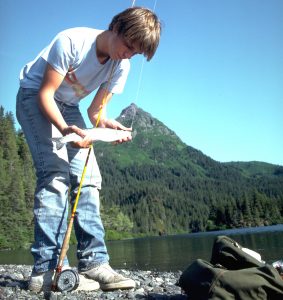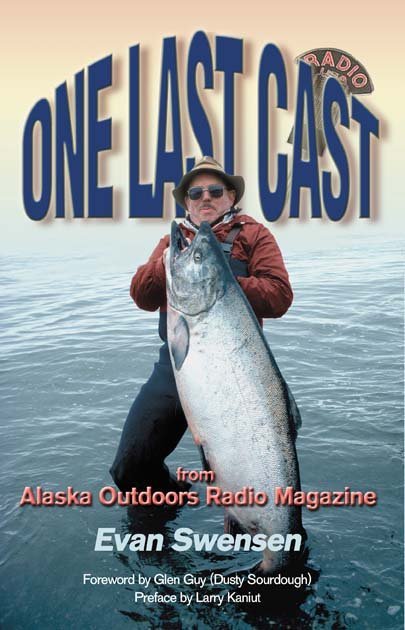One Last Cast
From Alaska Outdoors Radio Magazine
By Evan Swensen
Chapter Thirty-Nine
Speechless Brothers

Our wait at the Homer small boat harbor was not unpleasant while we waited for the arrival of our guide, Kevin Sidelinger. Lars and I witnessed boats of all shapes and sizes being backed down the ramp and launched to ports who knows where. Some were sleek manufactured craft. Others homemade. Some big. Some small. Some open. Some enclosed.
One anxious boater forgot to put in the drain plug before launching and nearly sunk his craft before getting it back on the trailer to drain, put in the plug, and relaunch. Timed with the relaunch, Kevin’s boat slipped to the dock. Greetings and introductions were short, and in just a moment, our gear was stowed aboard his “workboat.” Kevin explained the safety features, told us where to sit, and we made a wakeless exit from the harbor.
Kevin and his wife Cindy call Halibut Cove home and headquarters for their Alpine Llama trips. Enroute, Kevin explained that the llamas had been transported from the cove to the lagoon earlier using this same boat. Animals and crew were awaiting our arrival.
Cindy and the balance of our party greeted us as we stepped ashore. Here we met the animals, as Kevin and Cindy affectionately call the llamas. After being introduced to the bearers of our packs, Conan the Barbarian and Boone the Explorer, we were soon on a first-name basis.
Dan and Linda, the leaders of our group, handled the loading with expert ease. Dan explained as he filled the packs with our gear; if the pack is too heavy or unbalanced, the llama will merely lie down. If the pack is loaded correctly, they will carry it for hours without prejudice. The Indians of South America call the llamas speechless brothers. Only a brother would carry the burdens they do without complaint. Boone and Conan accepted our gear without complaint.
Our destination was an alpine lake at the base of Chocolate Drop Mountain. Chocolate Drop is a small, 4,000-foot-high peak set in the center of a large valley. At the base of Chocolate Drop, we made camp.
Twenty yards from our tent was a small, clear-water creek terminating in the lake. Lars and I unpacked our fly rods before the tent was up. My first cast with a polar shrimp brought a tug to the line. The bow made several small runs, always staying in the current. Then, finally, I maneuvered him out of the fast water. By the time I had him beached, an audience gathered. “Trout for supper,” Cindy announced. “Catch three more.” The first one had been so easy I readily accepted the challenge.
Supper was late that night as Lars and I labored for the next three hours to accomplish our task. I learned again never to judge a fishing hole on the first cast. Later, Kevin took us out in the canoe, where we could even the score on the rainbows.
The following day we assaulted Chocolate Drop. The conversation at the top turned to the animals. We found them to be wonderful companions on the trail. They seem to anticipate what was required. They are quiet, docile, intelligent, and extremely sure-footed. Because of their padded feet, they can travel over various terrain and steep mountainsides and trails.
Our zoology lesson continued around the evening fire, enjoying a meal of Cindy’s open-pit barbecue spare ribs. Each animal can carry three or four times what a person can comfortably pack. Because of the animals, we had luxuries on this trip that were uncommon or nonexistent on most backpack trips.
Lars and I enjoyed exploring, canoeing, fishing, and climbing in Kachemak State Park for three days. We got closer as father and son, and to the land we call home. And, we wished for more as we bid our speechless brothers goodbye.
On our return to the Homer small boat harbor, it came to our memory that the Homer Spit is the end of the Pan American Highway that begins in Argentina. This road passes through Peru, Bolivia, and other South American countries, the ancient home of the llama. So I suppose it is only fitting that one of the world’s oldest domestic animals be earning its living at the end of the road that began close to the animal’s beginning.
Oh, yes, before I forget. Concerning the llamas’ reputation for spitting. The only spit we saw was the Homer spit.


